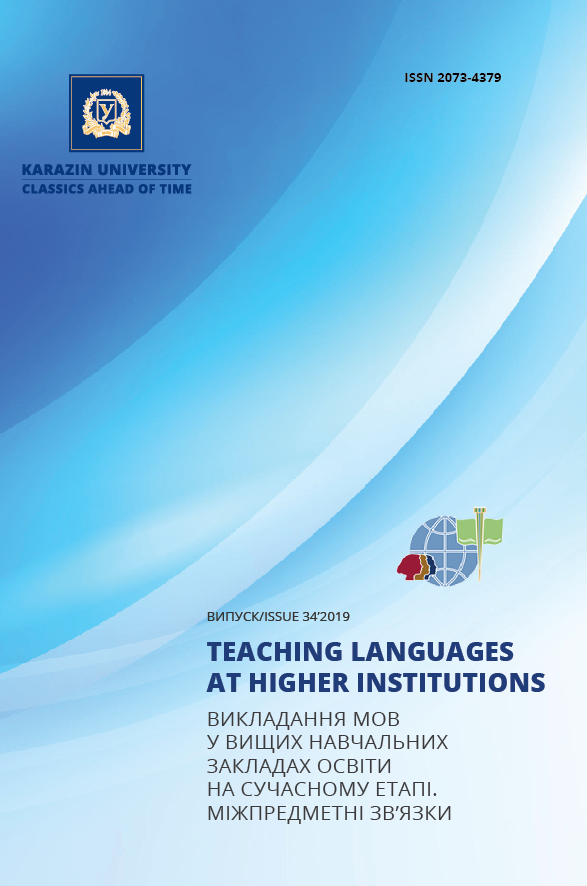The formation of a professionally-oriented communicative competence of foreign students-economists by means of distance technologies
Abstract
The article deals with the use of foreign language distance learning for first-year foreign students of economic specialties. The implementation of distance learning is one of the ways to modernize the education in Ukraine in the context of globalization and the intensive development of information technologies. Distance technologies are now widely used in many fields of education, especially when teaching a foreign language to inophones. Creating an effective learning system, based on information technology, is an urgent task at all levels of education.
One of the systems focused on the professional development of future specialists is the system of teaching students a foreign language using information technology. The possibilities of organizing the educational process are not limited to traditional and distance learning. There is a significant educational sector in which distance learning cannot be fully applied, but individual elements of e-learning can be used (in particular, distance learning technologies). It is referred to full-time and part-time (1-2 courses) forms of higher education.
The mixed learning has become a special role as a more perfect model of the educational process organization, which takes the advantage of distance learning and compensates for these disadvantages. To improve the organization of the educational process for the language training of foreign students, we consider appropriate to use the materials of distance courses in the models of mixed learning. The options for integrating distance learning into the traditional system of language training for foreigners in the mixed learning models have been analyzed. When integrating the model into a traditional educational process at this stage of foreigners' training, it is suggested to use the distance course developed by us with the prevailing classroom component, because the degree of students' independent work in learning the teaching material of the discipline in the first year is not high.
The structure and content of the distance course «Foreign Language» (educational-professional sphere of communication connection), designed on the Moodle platform, are considered in the article. The importance of using distance technologies in the process of organizing language training for foreign students is noted. It contributes to the formation of professional competence of future specialists in the field of economics.
Downloads
References
Kopylova, E.V., Kuriljuk, T.I. and Sanina, L.P. (2011). Chitaem teksty po ekonomike [We read texts on economics]. Kharkiv: V.N. Karazin Kharkiv National University [in Russian].
Kukharenko, V.M. Zmishane navchannya. Vebinar. [Mixed learning. Webinar]. Available at: http://www.wiziq.com/online-class/2190095-intel-blended [Accessed Feb. 20, 2019] [in Ukrainian].
Kukharenko, V.M., Berezenska, S.M., Bugajchuk, K.L., Olijnyk, N.Yu. at al. (2016). Teoriya ta praktyka zmishanogo navchannya [Theory and practice of mixed learning]. Kuxarenko, V.M. (Ed.). Kharkiv: «Miskdruk», NTU “HPI” [in Ukrainian].
Mitrofanova, O.D. (1985). Nauchnyj stil rechi: problemy obuchenija [Scientific style of speech: problems of teaching/learning]. Moscow: Russkij jazyk [in Russian].
Pogorel'skaja, L.I. (2015). Osobennosti nauchnogo teksta v uchebnom posobii po jazyku specialnosti [Features of the scientific text in the textbook on the specialty language]. In: XIII Kongress MAPRJAL “Russkij jazyk i literatura v prostranstve mirovoj kultury” [The Thirteenth Congress MAPRYAL “Russian language and literature in the space of world culture”]. Granada, Ispanija, 10, pp. 830–834 [in Russian].
Sikora, Ya. (2016). Realizaciya zmishanogo navchannya u vy`shhomu navchal`nomu zakladi [The implementation of mixed learning in a higher educational institution]. Naukovyj visnyk Uzhgorodskogo nacionalnogo universytetu [Scientific bulletin of Uzhgorod National University]. Uzhgorod, 2, pp. 236–239 [in Ukrainian].
Starichenko, B.E., Semenova, I.N. and Slepuhin, A.V. (2014). O sootnoshenii ponjatij elektronnogo obuchenija v vysshej shkole [On the relationship between the concepts of e-learning in higher education]. Obrazovanie i nauka [Education and science], 9, pp. 51–68 [in Russian].
Vymohy do struktury dystantsiinoho kursu, zatverdzheni rishenniam Koordynatsiinoi rady z pytan elektronnoho (dystantsiinoho) navchannia Kharkivskoho natsionalnoho universytety imeni V.N. Karazina vid 08.10.2013 r. Protokol № 2 [Requirements of the distance course approved by the Coordinating Council for electronic (distance) training at V.N. Karazin Kharkiv National University, Prot. 2 dated October 8, 2013]. Available at: http://dist.karazin.ua/moodle/cource [Accessed Feb. 20, 2019] [in Ukrainian].

